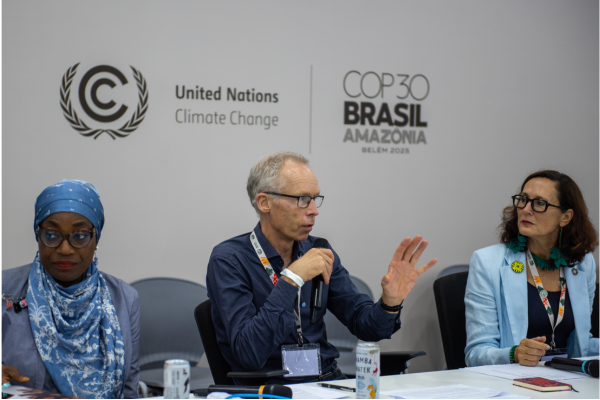Earth for All Germany: Towards a Future for All was published on 14 October. In this blog, co-authors Till Kellerhoff and Peter Hennicke argue that it is possible to transform Germany’s economy, and that now is the time for bold and comprehensive investments in a better future for the country.
Can 150 years of industrial history and capitalism, based on exponentially growing resource consumption, be transformed into a climate-neutral, just and largely circular economy within the next 25 years as part of a radical and comprehensive social-ecological change? In principle – yes .
As early as 1972, the Club of Rome warned in its first report, The Limits to Growth, that it is impossible to sustain infinite material growth on a finite planet. Both in terms of resource consumption and the absorption capacity of our atmosphere, oceans and ecosystems, there are limits to our expansive economic model. However, these concerns have been ignored too often – consciously and unconsciously – in recent decades.
Nevertheless, this insight remains true – and is more relevant today than ever. Globally, we have crossed six of the planet’s nine planetary boundaries, with the seventh soon to be breached. The effects of this global ecological overshoot are visible, tangible and measurable worldwide, for example in the form of deforestation, soil erosion, loss of biodiversity and the accumulation of carbon dioxide in the atmosphere.
As a rich industrialised country, Germany has contributed disproportionately to this overshoot.
We also see that an economic system geared towards limitless extraction and expansion not only destroys the natural foundations on which it depends, but is also unable to ensure the wellbeing of all people. Inequality is increasing with the gap between rich and poor widening.
It is time for a radical change – a giant leap towards a social-ecological transformation that ensures wellbeing for all within the planetary boundaries.
The illusion of limitless growth
The idea of unlimited economic growth as an indicator of increasing wellbeing has long been abandoned. Growth that does not contribute to greater life satisfaction is growth at the expense of the environment, our contemporaries and future generations.
Instead, we need new visions for a ‘wellbeing society’ that does not prioritise the insatiable desire for more wealth, power, production and consumption, but rather the wellbeing of all within the ecological capacities of our planet. However, this goal should not become an idealistic dream or a superficial gesture for a better world. And shifting the responsibility onto individuals, while politically convenient, is futile: relying on appeals to individual behavioural change to fix systemic crises is doomed to fail. Instead, it is imperative to formulate concrete policy steps that provide answers on how to solve the social and ecological question together and at the systemic level.
In our view, to make the Giant Leap, five turnarounds must be tackled together and swiftly. Earth4All shows that it is more effective, cost-efficient and easier to make this transformation holistic rather than implementing isolated measures. Only in this way can synergies be tapped and the necessary acceptance among the population gained.
- Poverty: . Only by eradicating poverty – both globally and nationally – can we lay the foundation for a just and sustainable society. Targeted public investment and a fairer distribution of wealth are essential to this end.
- Inequality: Addressing inequality is critical for the success of a socio-ecological transformation. The richest 10% of Germans own over 60% of the wealth and at the same time contribute disproportionately to environmental destruction. Taxing the rich more and making access to resources fairer is not only ecologically necessary, but also strengthens social cohesion and democracy.
- Empowerment: Women and marginalised groups must be more involved in shaping our future. Strengthening self-efficacy, a fairer care system and a transformation of the education system are central levers for developing the full potential of all people and driving change.
- Food system transformation: Our current food system is harmful to both our health and the planet. Greater promotion of plant-based foods, more sustainable agriculture and fairer distribution of resources are key to a healthy and sustainable food culture.
- Energy transition: A completely climate-neutral energy supply is feasible. To achieve this, we must invest in renewable energies, but also reduce our energy consumption. Energy efficiency, sufficiency and the rapid implementation of renewable energies are essential to make the energy transition a success.
The necessary transformation does not mean doing without or making sacrifices – it is an opportunity for a better life for all. It is about distributing the wealth generated by society more fairly and at the same time using resources more sparingly.
Technological solutions such as renewable energies and energy efficiency are central building blocks, but they are not enough. The growing global demand for resources and land, even for renewables like wind and solar, puts pressure on our planetary limits. We also need to prioritise land restoration, preserve forests, and have sufficient arable land for growing food. Our aim should be not just to produce cleaner energy but also to reduce overall consumption.
People support change
A survey conducted on behalf of Earth4All shows that these changes do have the support of a majority of citizens in the G20 countries – if the right framework is created by policymakers.
66% of Germans believe that the world will have to take drastic measures in all economic sectors (such as energy, transport, industry, and food) over the next ten years. The majority (71%) believe that wealthy people should pay higher taxes , 75% believe that the government should ensure free healthcare, and 71% consider it important to strengthen workers’ rights.
Taking an integrated approach that strengthens social cohesion and democracy is the key to success. If the transformation is carried out at the expense of those who have hardly benefited from our economic system in the past decades, it endangers democracy.
The Giant Leap offers the chance to close social divides and shape change together.
Investing in the future
The realisation of a Giant Leap requires bold and comprehensive investments in the future. These are not only necessary to avert future damage, but they are also financially viable. The transformation and initial investments needed could be supported financially by higher taxes on the rich. But a reform of the debt brake, which limits government borrowing, is essential to allow the large investments needed for ecological transformation.
Despite the current multiple crises we face, there are good reasons for optimism. For example we see drastic cost reductions for renewable energies and worldwide social movements for an integrated system change. The time for courage, vision and decisive action is now.



